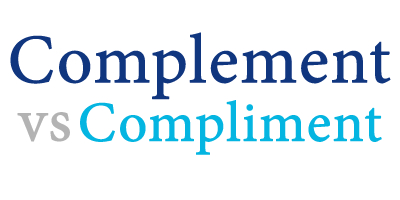Compliment and complement are right alongside other English homophones such as there, their, and they’re and to, too, and two.
Homophones are words that, despite sounding identical, actually have different meanings.
The two words compliment vs. complement are especially tricky, however, because they are long words and the only spelling difference between them is one little vowel tucked in the middle. One word is spelled with an “e” and the other is spelled with an “i.”
What is the Difference Between Compliment and Complement?
In this post, I will outline the differences and definitions of these two words. I will go over the functions of each word and use example sentences to show how they are used in real-life sentences from newspaper outlets and print journals.
After reading this post, you shouldn’t ever second guess yourself by saying, “Should I use compliment or complement?”
When to Use Compliment
 What does compliment mean? Compliment can function as both a noun and a verb.
What does compliment mean? Compliment can function as both a noun and a verb.
When used as a noun, a compliment is a flattering or praising remark.
- Your friend gave me a nice compliment yesterday. (Noun)
- The remarks you gave are a tremendous compliment. (Noun)
- Just a month ago, Apple paid Microsoft a high compliment by seeming to have copied the device with its new iPad Pro. –The New Yorker
When used as a verb, to compliment means to praise or to express esteem. For example,
- I tried to compliment his outfit, but he was busy talking. (Verb)
- Your friend complimented my hair yesterday. (Verb)
- Mattingly was often complimented by club officials, but he has not been identified as the team’s leader for the foreseeable future. –L.A. Times
When to Use Complement
What does complement mean? Complement can also function as both a noun and a verb. It denotes completeness or the process of supplementing something.
When used as a noun, a complement is something that completes or brings to perfection.
- Dressing is an expected complement of salad. (Noun)
- That shirt is a perfect complement for those pants. (Noun)
- We have a lot of celebrities who flaunt their hourglass figures, and the corset really is a complement to that figure. –The New York Times
When used as a verb, to complement means to supplement adequately or to complete. For example,
- That shirt really complements your eyes. (Verb)
- This sauce complements the natural flavors of the meat. (Verb)
- In any given space you want a mix of patterns, textures and colors that complement each other but that don’t look too matchy. –The Washington Post
Tricks to Remember the Difference
Don’t think you will be able to remember all of this next time you are picking between complement vs. compliment? Here’s a useful mnemonic that will be able to help you through those times of indecision.
A good way to remember the difference between these two words is to remember that “I” make compliments to other people. “I” make compliments about people’s clothes and compliment has an “i” in it.
Summary
So is it complement or compliment? That, of course, depends on the context of your sentence. Each word has is own purpose and function.
A complement is something that completes something else or brings it to perfection.
A compliment is a polite expression of praise or admiration.
http://writingexplained/affect-vs-effect
Contents
